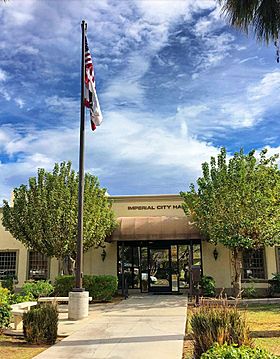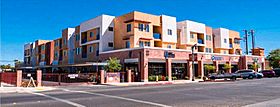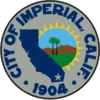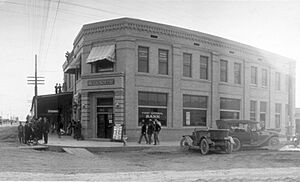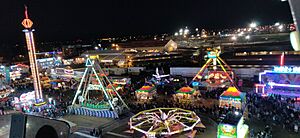Imperial, California facts for kids
Quick facts for kids
Imperial, California
|
||
|---|---|---|
| City of Imperial | ||
|
Top: Imperial City Hall;
Bottom: Worthington Square Imperial |
||
|
||
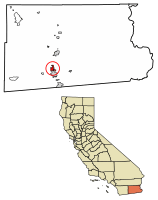
Location of Imperial in Imperial County, California.
|
||
| Country | United States | |
| State | California | |
| County | Imperial | |
| Incorporated | July 12, 1904 | |
| Area | ||
| • City | 6.29 sq mi (16.29 km2) | |
| • Land | 6.29 sq mi (16.29 km2) | |
| • Water | 0.00 sq mi (0.00 km2) 0% | |
| Elevation | -59 ft (-18 m) | |
| Population
(2020)
|
||
| • City | 18,631 | |
| • Density | 2,880.76/sq mi (1,112.18/km2) | |
| • Metro | 175,000 | |
| Time zone | UTC-8 (Pacific (PST)) | |
| • Summer (DST) | UTC-7 (PDT) | |
| ZIP code |
92251
|
|
| Area code | 442/760 | |
| FIPS code | 06-36280 | |
| GNIS feature IDs | 1652726, 2410097 | |
Imperial is a city in Imperial County, California. It is about 4 miles (6 km) north of El Centro.
In 2010, the city had about 14,758 people. It is part of the El Centro metropolitan area. Imperial was one of the fastest-growing cities in California in 2016. Its population grew by 4.1 percent in just one year.
Contents
History of Imperial
The city of Imperial was started by the Imperial Land Company. George Chaffey gave the city its name. Imperial got its first post office in 1901. The city officially became a city (was incorporated) in 1904. Allison Peck was the first mayor of Imperial.
The town was planned in 1902 for homes and businesses. Its first buildings included a printing press, a drug store, and a church. Imperial was also home to the first school and the first Chamber of Commerce in the valley.
Imperial was the first city in the valley to become officially incorporated on July 12, 1904. It was first thought to become the county seat, which is like the main city for the county. But in 1907, El Centro became the county seat instead.
Over the years, Imperial became home to important places. These include the Imperial Irrigation District, the California Mid-Winter Fair, and the Imperial County airport. Many businesses also opened in the city. Imperial was hit by strong earthquakes in 1916 and 1940. In 1979, another earthquake damaged many old buildings downtown, including City Hall. It took several years for the city to rebuild its business area.
In June 2014, a McDonnell Douglas AV-8B Harrier II jet from Marine Corps Air Station Yuma crashed in a neighborhood. The pilot was safe, and no one on the ground was hurt.
Geography and Landscape
Imperial covers about 5.9 square miles (15.3 square kilometers) of land. It is located in the Imperial Valley, which is part of the Colorado Desert. The city is actually 59.5 feet (18.14 meters) below sea level.
Farmers in the area get water from canals. These canals bring water from the nearby Colorado River. The Salton Sea was formed in 1905 after a flood from the Colorado River.
The land in this region is always changing. This is because it is where two large tectonic plates meet. These plates are slowly moving apart and sliding past each other. This movement causes earthquakes in the area. It also makes the land slowly sink over time.
Climate and Weather
Imperial has a very hot desert climate. Summers are long and extremely hot. Winters are mild and pleasant. Imperial gets only about 3 inches (7.6 cm) of rain each year. December is usually the wettest month.
From July to September, the North American Monsoon brings more humidity. Sometimes, the weather can feel like tropical areas. This can lead to daily thunderstorms with hail, heavy rain, lightning, and dust storms called Haboobs.
During hurricane season, storms from the Pacific Ocean sometimes move up the Baja California Peninsula. These storms can bring heavy rain to the desert. This can cause flash floods. In winter, rain showers come from occasional storms. These storms can bring cold temperatures and mountain snowfall to nearby areas. Snow almost never falls in Imperial. A tiny bit fell in 1932, and sleet mixed with hail fell briefly in 1967.
On average, temperatures drop below freezing about 3.7 days a year. In December, the coldest month, the average high is 67.5°F (19.7°C). The average low is 42.3°F (5.7°C). In August, the warmest month, the average high is 104.5°F (40.3°C). The average low is 78.4°F (25.8°C).
| Climate data for Imperial, California, 1991–2020 normals, extremes 1901–present | |||||||||||||
|---|---|---|---|---|---|---|---|---|---|---|---|---|---|
| Month | Jan | Feb | Mar | Apr | May | Jun | Jul | Aug | Sep | Oct | Nov | Dec | Year |
| Record high °F (°C) | 96 (36) |
96 (36) |
104 (40) |
109 (43) |
118 (48) |
123 (51) |
124 (51) |
124 (51) |
120 (49) |
111 (44) |
101 (38) |
90 (32) |
124 (51) |
| Mean maximum °F (°C) | 80.6 (27.0) |
83.9 (28.8) |
92.1 (33.4) |
99.7 (37.6) |
105.0 (40.6) |
113.6 (45.3) |
115.6 (46.4) |
114.6 (45.9) |
110.4 (43.6) |
101.8 (38.8) |
89.9 (32.2) |
79.1 (26.2) |
117.0 (47.2) |
| Mean daily maximum °F (°C) | 68.7 (20.4) |
72.2 (22.3) |
78.4 (25.8) |
84.3 (29.1) |
92.5 (33.6) |
100.8 (38.2) |
104.4 (40.2) |
104.5 (40.3) |
99.9 (37.7) |
88.9 (31.6) |
76.7 (24.8) |
67.5 (19.7) |
86.6 (30.3) |
| Daily mean °F (°C) | 56.0 (13.3) |
59.4 (15.2) |
65.0 (18.3) |
70.4 (21.3) |
77.8 (25.4) |
85.4 (29.7) |
90.9 (32.7) |
91.4 (33.0) |
86.6 (30.3) |
75.2 (24.0) |
63.2 (17.3) |
54.9 (12.7) |
73.0 (22.8) |
| Mean daily minimum °F (°C) | 43.3 (6.3) |
46.6 (8.1) |
51.5 (10.8) |
56.4 (13.6) |
63.0 (17.2) |
70.0 (21.1) |
77.3 (25.2) |
78.4 (25.8) |
73.2 (22.9) |
61.4 (16.3) |
49.8 (9.9) |
42.3 (5.7) |
59.4 (15.2) |
| Mean minimum °F (°C) | 33.4 (0.8) |
36.6 (2.6) |
41.3 (5.2) |
46.7 (8.2) |
53.7 (12.1) |
60.1 (15.6) |
68.1 (20.1) |
69.0 (20.6) |
62.2 (16.8) |
50.0 (10.0) |
39.0 (3.9) |
32.2 (0.1) |
31.0 (−0.6) |
| Record low °F (°C) | 16 (−9) |
22 (−6) |
30 (−1) |
35 (2) |
43 (6) |
50 (10) |
51 (11) |
60 (16) |
49 (9) |
36 (2) |
27 (−3) |
21 (−6) |
16 (−9) |
| Average precipitation inches (mm) | 0.47 (12) |
0.43 (11) |
0.31 (7.9) |
0.09 (2.3) |
0.06 (1.5) |
0.00 (0.00) |
0.14 (3.6) |
0.18 (4.6) |
0.26 (6.6) |
0.21 (5.3) |
0.22 (5.6) |
0.39 (9.9) |
2.76 (70.3) |
| Average precipitation days (≥ 0.01 in) | 3.2 | 2.7 | 1.9 | 0.7 | 0.3 | 0.1 | 0.8 | 1.4 | 1.1 | 0.9 | 1.3 | 2.8 | 17.2 |
| Source 1: NOAA | |||||||||||||
| Source 2: National Weather Service | |||||||||||||
Population and People
| Historical population | |||
|---|---|---|---|
| Census | Pop. | %± | |
| 1910 | 1,257 | — | |
| 1920 | 1,885 | 50.0% | |
| 1930 | 1,943 | 3.1% | |
| 1940 | 1,493 | −23.2% | |
| 1950 | 1,759 | 17.8% | |
| 1960 | 2,658 | 51.1% | |
| 1970 | 3,094 | 16.4% | |
| 1980 | 3,451 | 11.5% | |
| 1990 | 4,113 | 19.2% | |
| 2000 | 7,560 | 83.8% | |
| 2010 | 14,758 | 95.2% | |
| 2020 | 20,263 | 37.3% | |
| 2021 (est.) | 21,017 | 42.4% | |
| U.S. Decennial Census | |||
2010 Census Data
In 2010, the population of Imperial was 14,758 people. Most people (99.8%) lived in homes. About 33.4% of the population was under 18 years old. The median age was 29.9 years. This means half the people were younger than 29.9 and half were older.
There were 4,405 households in Imperial. More than half (55.9%) of these households had children under 18. About 60.6% were married couples living together. The average household had about 3.34 people. Most homes (71.1%) were owned by the people living in them.
Arts and Culture
The annual California Mid-Winter Fair is a big event in Imperial. It usually happens in February. More than 100,000 people visit the fair.
The California Mid-Winter Fairgrounds is in the middle of Imperial. The fair is the biggest event in the county. It lasts for 10 days. The fairgrounds also host other events all year. These include festivals, barbecues, car races, and concerts. Many visitors come from nearby Mexicali, Baja California, Mexico. Also, many "snowbirds" (people who move to warmer places for winter) visit from other parts of the U.S.
Imperial also hosts Imperial Market Days. These are special events put on by the city. They help improve the quality of life in Imperial Valley. These events start in October and happen in Downtown Imperial. They are free for everyone to attend. Many local businesses and people come together for these events. They have attracted up to 13,000 people. Over 100 different vendors take part in each event.
City Services
The city of Imperial manages its own water and sewer systems. Republic Services handles trash collection. Other companies provide services like gas (Southern California Gas), electricity (Imperial Irrigation District), and internet/phone (AT&T California, Spectrum).
Famous People from Imperial
- Royce Freeman, a football player
- Charles Harris Garrigues, a newspaperman
- Ben Hulse, a member of the California State Senate
- Andy Ruiz Jr., a boxer and former world heavyweight champion
Images for kids
See also
 In Spanish: Imperial (California) para niños
In Spanish: Imperial (California) para niños


